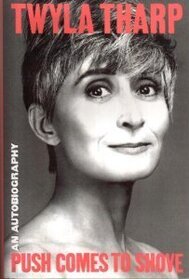Search -
Push Comes to Shove: An Autobiography
Push Comes to Shove An Autobiography
Author:
An electrifying performer and one of the greatest choreographers of her time, Twyla Tharp is also an intensely private woman whose supremely inventive dances have spoken for her, revealing a spirit full of joy and pain, contradictions and questions - and answers. — Now, in her own words, Twyla Tharp offers a rare and provocative glimpse into the ... more »
Author:
An electrifying performer and one of the greatest choreographers of her time, Twyla Tharp is also an intensely private woman whose supremely inventive dances have spoken for her, revealing a spirit full of joy and pain, contradictions and questions - and answers. — Now, in her own words, Twyla Tharp offers a rare and provocative glimpse into the ... more »
ISBN-13: 9780553073065
ISBN-10: 0553073060
Publication Date: 11/1/1992
Pages: 376
Rating: 2
ISBN-10: 0553073060
Publication Date: 11/1/1992
Pages: 376
Rating: 2
4.8 stars, based on 2 ratings
Genres:
- Arts & Photography >> Performing Arts >> Dance >> Modern
- Biographies & Memoirs >> Arts & Literature >> Dancers
- Biographies & Memoirs >> Specific Groups >> Women




